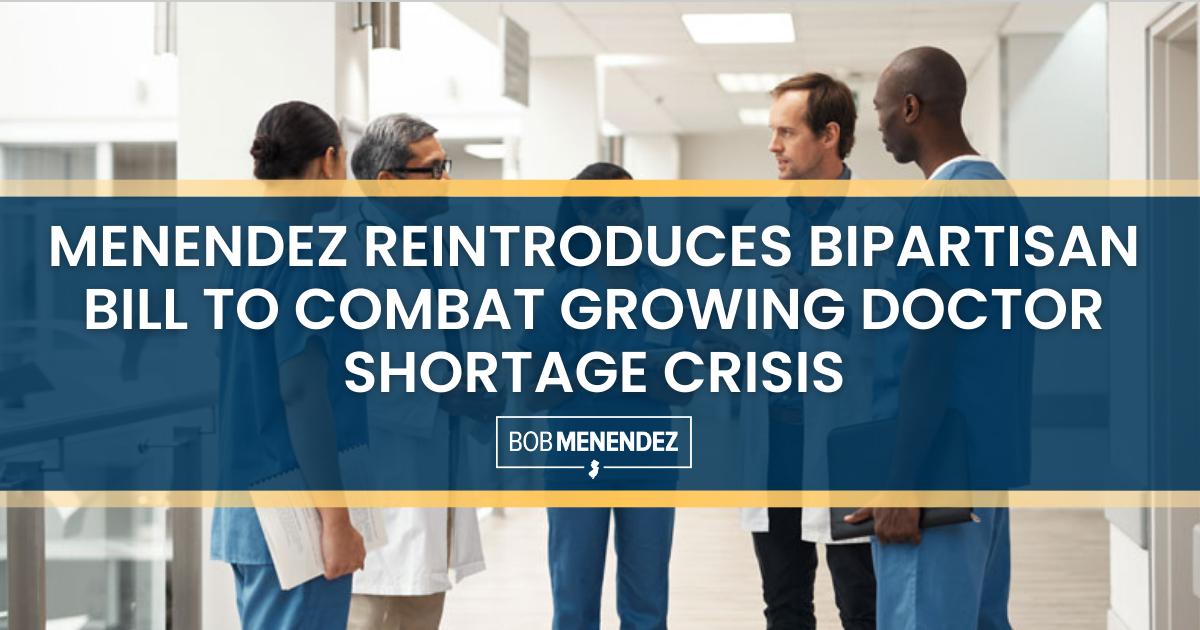Source: United States Senator for New Jersey Bob Menendez
WASHINGTON, D.C. – As the health needs of an aging population continuously increase and the country faces an ongoing doctor shortage as a result of the COVID-19 pandemic, U.S. Senators Bob Menendez (D-N.J.), John Boozman (R-Ark.), Majority Leader Chuck Schumer (D-N.Y.), and Susan Collins (R-Maine) today announced the reintroduction of the bipartisan Resident Physician Shortage Reduction Act to considerably increase Medicare-supported doctor training slots to address the growing nationwide physician shortage crisis. According to the Association of American Medical Colleges (AAMC), the United States is expected to face a shortage of up to 124,000 primary care and specialty physicians by 2034.
“There is a continued urgent need for physicians as we emerge from the pandemic, and we have a duty to ensure all Americans around the country have access to quality health care now and in the future,” said Sen. Menendez. “The COVID-19 pandemic highlighted and exacerbated the nation’s shortage of primary and specialty care physicians, particularly in underserved and rural areas. This bill will ensure that the urgent need to bolster physician training is met in order to provide for the diverse and growing healthcare necessities of Americans throughout the country.”
“To ensure we are prepared for evolving challenges in medical care and treating patients, we must have a well-trained physician workforce. Arkansans and communities throughout the country depend on access to life-saving and preventative care, which underscores the need for an ample pipeline of medical students. By expanding training opportunities for medical school graduates, we can help address the growing shortage of physicians nationwide and improve access to quality health care close to home,” said Sen. Boozman.
“At the beginning of the COVID-19 pandemic, New Yorkers joined together every night to cheer for medical workers and thank them for their sacrifice. Three years later, our healthcare system has been severely strained and our country is facing an alarming doctor shortage, especially in rural and underserved communities. It is critical that we provide the support needed to recruit, train and retain doctors in all parts of our healthcare system so all citizens have access to high-quality healthcare,” said Majority Leader Schumer. “Let’s fix this crisis and pass the Resident Physician Shortage Reduction Act.”
“In the midst of growing demand for medical treatments and services, our country continues to face a shortage of trained physicians. It is critical that we bridge the gap,” said Sen. Collins. “This bipartisan legislation would support critical training opportunities needed to alleviate the physician shortage and improve access to health care, particularly in rural or underserved communities, which in turn promotes healthier lives.”
The bipartisan Resident Physician Shortage Reduction Act would lift the arbitrary cap on the number of Medicare-funded graduate medical education (GME) positions and gradually raise the number of GME positions by an additional 14,000 over seven years. The legislation prioritizes an increase in positions in hospitals located in states with new medical schools, training over their caps, in rural areas, and serving Health Professional Areas (HPSAs).
Each year, New Jersey has approximately 3,100 physician residents in training at 43 hospitals. However, the New Jersey Hospital Association (NJHA) estimates that New Jersey has only 32 medical students and resident physicians in training per 100,000 residents compared to 81 and 62 in neighboring New York and Pennsylvania, respectively. According to data from AAMC in their 2022 Physician Specialty Data Report, nearly half of physicians in the United States were age 55 or older, and according to NJHA the state ranks 46th in the nation in the percentage of doctors under the age of 40.
In 2022, Sen. Menendez, a longtime leader in the effort to expand GME who secured 1,000 new GME slots for the first time since 1997 in the FY21 appropriations law, co-lead a bipartisan group of colleagues on the introduction of the Training Psychiatrists for the Future Act. The bill would add 400 new physician residency positions per year funded by Medicare to teaching hospitals for training new physicians in psychiatry and psychiatry subspecialties.
“The AAMC applauds Senators Bob Menendez (D-N.J.), John Boozman (R-Ark.), Susan Collins (R-Maine), and Senate Majority Leader Chuck Schumer (D-N.Y.) for introducing important, bipartisan legislation to help expand the physician workforce and address the estimated physician shortage of up to 124,000 doctors by the year 2034. By making these critical investments in physician training, this legislation serves to strengthen the health care workforce and improve the health of patients, families, and communities nationwide,” said the Association of American Medical Colleges (AAMC).
“Hospitals are emerging from the pandemic with the dual crises of soaring inflation and a worsening labor shortage,” said Greater New York Hospital Association President Kenneth E. Raske. “The time to reinvest in our physician workforce is now. This important bill tackles the problem head-on by adding 14,000 Medicare-funded graduate medical education slots. The teaching hospital community thanks Senators Menendez, Schumer, Boozman and Collins for their leadership on this vital issue.”
The full text of the legislation can be found HERE.
###
